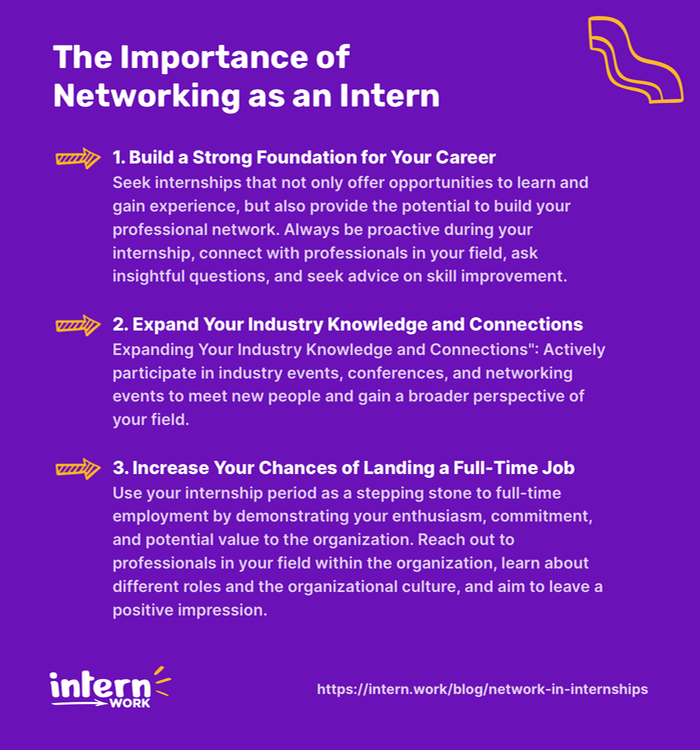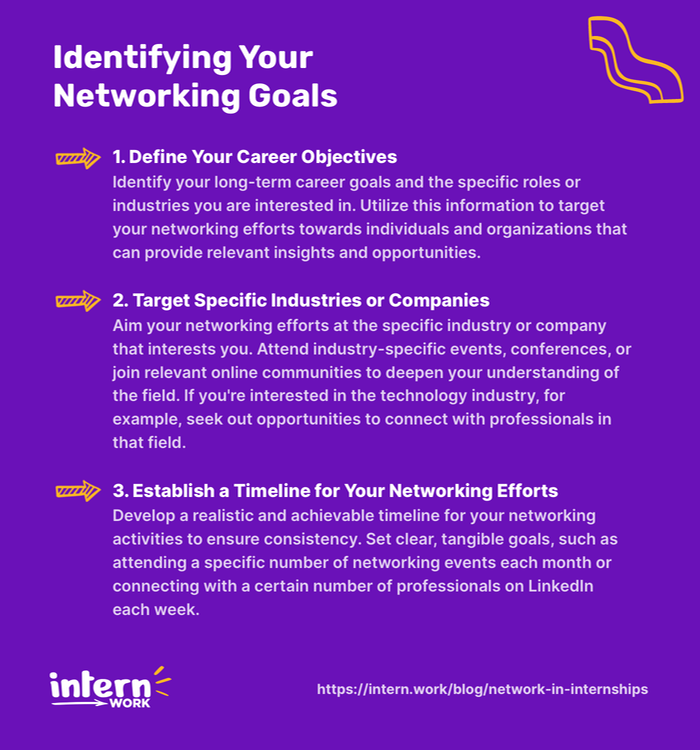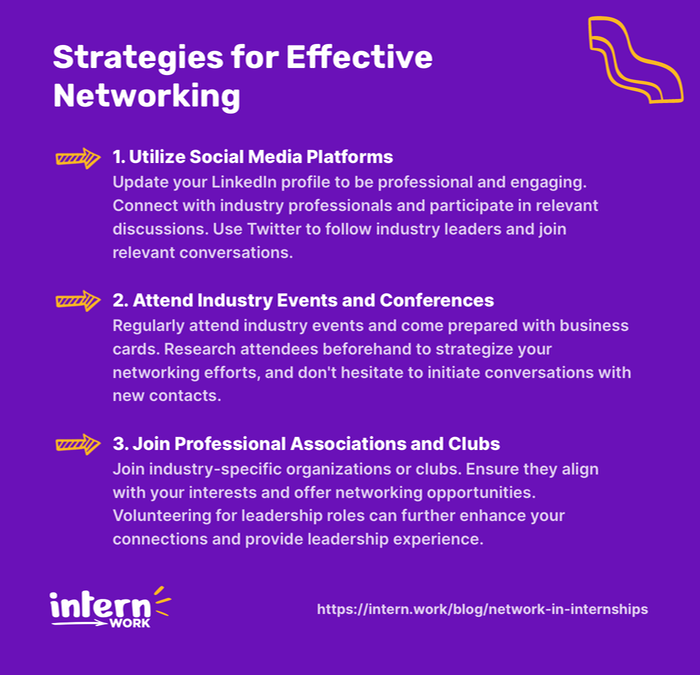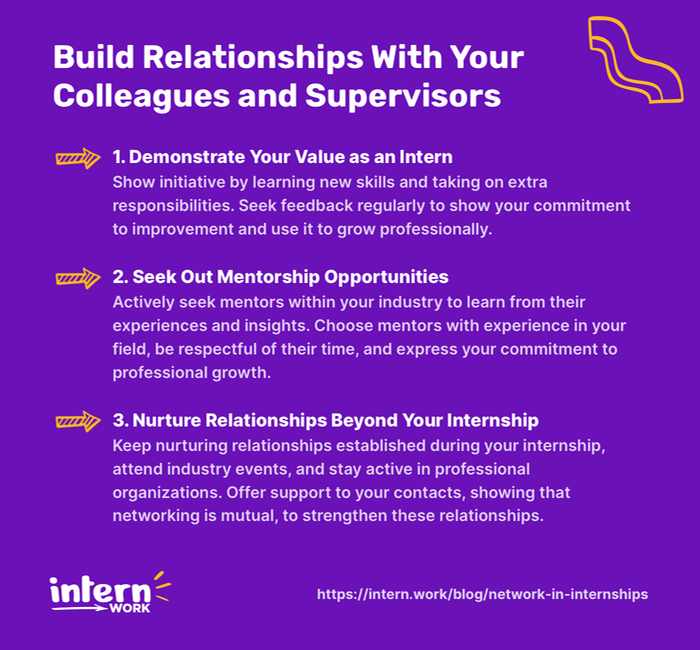
As an intern, you have a unique opportunity to build your professional network. While your primary goal may be to gain experience and skills, networking can significantly impact your career trajectory. This article discusses the importance of networking as an intern. It provides actionable strategies to help you effectively build your professional network.
The Importance of Networking as an Intern
As an intern, you might think your role is insignificant and your time is better spent focusing on your day-to-day duties. However, networking is just as important as gaining experience and learning new skills. In fact, networking can help you build a strong foundation for your career, expand your industry knowledge and connections, and increase your chances of landing a full-time job.
1. Building a Strong Foundation for Your Career
Internships can be a vital stepping stone in your professional journey. While gaining experience and learning new skills are essential aspects of an internship, building a solid network can help you establish lasting relationships throughout your career. These connections can provide support, guidance, and even job opportunities later.
For example, let’s say you’re interning at a marketing firm. By networking with professionals in the industry, you can gain insight into different marketing strategies, learn about the latest trends, and even get advice on improving your skills. This knowledge can be invaluable as you progress in your career.
2. Expanding Your Industry Knowledge and Connections
Networking with professionals in your industry can also help you expand your industry knowledge and connections. By attending industry events, conferences, and networking events, you can meet new people and learn about different aspects of the industry.
For instance, you might attend a marketing conference where you meet professionals from various marketing firms. You can learn about their experiences and gain insights into different marketing strategies by talking to them. You might also connect with professionals who work at other firms, which can be beneficial if you switch jobs later.
3. Increasing Your Chances of Landing a Full-Time Job
Internships are often a pathway to full-time employment. Networking with professionals at your organization or in similar roles can increase your chances of being considered for a permanent position at the end of your internship.
For example, let’s say you’re interning at a law firm. By networking with lawyers and other legal professionals, you can learn about the different areas of law and gain insight into the firm’s culture. Make a positive impression and establish a connection with someone at the firm. They may be more likely to recommend you for a full-time position.
See, networking is a crucial aspect of any internship. By building a solid network, expanding your industry knowledge and connections, and increasing your chances of landing a full-time job, you can set yourself up for success in your career.

Networking as an intern is essential for building a strong foundation, expanding industry knowledge, and increasing job prospects. Connect with professionals, attend events, and make meaningful relationships to gain insights and opportunities for future success.
Identify Your Networking Goals
Before you begin building your network, you must identify your networking goals. This will help you focus your efforts and ensure that you’re making the most of your time.
Networking is an essential tool for career advancement. It can help you gain new insights, expand your knowledge, and open doors to new opportunities. However, it’s important to clearly understand your networking goals before you begin.
1. Define Your Career Objectives
Think about your long-term career goals. What is it that you want to achieve? Do you see yourself in a specific role or industry? Identifying these objectives will help you target your networking efforts to the right people and organizations.
For example, suppose you’re interested in becoming a marketing manager. In that case, you’ll want to network with people already in that role or working in the marketing industry. This will help you better understand the skills and experience required for the job and help you identify job opportunities.
2. Target Specific Industries or Companies
You must network within that specific sphere if you’re interested in a particular industry or company. This will help you gain a deeper understanding of the industry and help you identify job opportunities.
For example, suppose you’re interested in the technology industry. In that case, you might attend industry-specific conferences or join online communities to connect with other professionals in the field. This will help you stay up-to-date on the latest trends and help you identify job opportunities.
3. Establish a Timeline for Your Networking Efforts
Networking is an ongoing process that requires consistency and dedication. Establishing a timeline will help you stay on track and ensure you devote enough time to building your network.
Set a goal to attend at least one networking event per month or connect with a certain number of people on LinkedIn weekly. Whatever your timeline, make sure it’s realistic and achievable.
Remember, networking is not just about meeting new people. It’s about building meaningful relationships and creating a network of people who can help you achieve your career goals. So take the time to identify your networking goals, target specific industries or companies, and establish a timeline for your efforts. Your future self will thank you!

Before networking, define your goals, including career objectives and targeted industries. Establish a timeline to attend events and connect with professionals. Meaningful relationships in your network can provide insights and opportunities for career advancement.
Strategies for Effective Networking
Networking is a crucial aspect of professional development and career growth. Building connections with other professionals in your industry can help you learn about new job opportunities, gain industry-specific knowledge, and find mentors who can guide you through your career.
1. Utilizing Social Media Platforms
Social media platforms like LinkedIn can be a fantastic tool for networking. Ensure that your profile is complete and professional-looking. You can use LinkedIn to connect with professionals in your industry, join groups, and even find job opportunities.
Another great way to utilize social media for networking is to engage in industry-specific conversations on Twitter. Following industry thought leaders and participating in Twitter chats can build relationships with other professionals and gain valuable insights into your industry.
2. Attending Industry Events and Conferences
Attending industry events and conferences enables you to meet and connect with professionals in your industry. It’s an excellent opportunity to learn about the latest trends and get insights into your industry’s direction.
When attending these events, you must come prepared with business cards and a plan for who you want to meet. Research the speakers and attendees beforehand, and list the people you want to connect with.
Also, feel free to converse with someone you don’t know. Networking events are designed for professionals to meet and connect, so take advantage of the opportunity!
3. Joining Professional Associations and Clubs
Joining a professional organization or club can be an excellent way to build connections and gain industry-specific knowledge. These organizations often offer networking events, seminars, and conferences that can be incredibly informative and beneficial.
When choosing a professional association or club to join, consider your industry and your career goals. Look for organizations that align with your interests and offer networking and professional development opportunities.
Volunteering for a leadership position within the organization can help you build relationships with other members and gain valuable leadership experience.
You can build a strong network of professionals in your industry by utilizing social media platforms, attending industry events and conferences, and joining professional associations and clubs. Networking is a continuous process, so don’t be afraid to put yourself out there and make new connections!

Networking is key for career growth. Utilize social media platforms like LinkedIn and Twitter to connect with professionals and engage in industry conversations. Attend industry events and conferences, come prepared, and strike up conversations. Join professional associations and clubs to build connections and gain industry-specific knowledge.
Build Relationships With Your Colleagues and Supervisors
Building relationships with your colleagues and supervisors is crucial to your success as an intern. These relationships can provide valuable support, guidance, and potential networking connections. However, it’s important to remember that building relationships takes time and effort.
1. Demonstrate Your Value as an Intern
One way to establish yourself as a valuable team member is by demonstrating your value as an intern. Take the initiative to learn new skills and take on additional responsibilities. Show your colleagues and supervisors you’re proactive, reliable, and willing to go above and beyond.
Additionally, feel free to ask for feedback on your performance. This will show that you’re committed to improving and open to constructive criticism. Use this feedback to make adjustments and continue to grow as a professional.
2. Seek Out Mentorship Opportunities
Mentorship can be a valuable part of your professional development. Seek out mentorship opportunities with professionals in your industry. This will allow you to learn from their experiences, gain insights, and potentially build a long-term relationship.
When seeking out a mentor, look for someone who has experience in your field and who you admire for their work. Reach out to them and express your interest in learning from them. Respect their time and clarify that you’re committed to learning and growing professionally.
3. Nurture Relationships Beyond Your Internship
Don’t let your networking efforts lapse once your internship has come to an end. Continue to nurture relationships with the professionals you’ve met throughout your internship, attend industry events, and stay active in your professional organizations. Maintaining these connections will ensure a robust and reliable network throughout your career.
It’s also important to remember that networking is a two-way street. Be willing to offer your own support and assistance to your professional contacts. This can help to strengthen your relationships and build a sense of reciprocity.
Building relationships with your colleagues and supervisors is essential to your professional development. By demonstrating your value as an intern, seeking out mentorship opportunities, and nurturing professional relationships beyond your internship, you can establish yourself as a valuable team member and build a strong network that will support you throughout your career.

Building relationships as an intern is vital. Demonstrate your value by taking the initiative and seeking feedback. Seek out mentorship opportunities with experienced professionals. Maintain connections beyond your internship through networking and reciprocity.
Key Takeaways
- Networking is crucial for interns as it helps build a strong foundation for their career, expand industry knowledge and connections, and increase their chances of landing a full-time job.
- Identifying networking goals is important to focus efforts and maximize networking opportunities. Consider long-term career objectives, target specific industries or companies, and establish a realistic timeline.
- Effective networking strategies include utilizing social media platforms like LinkedIn and Twitter, attending industry events and conferences, and joining professional associations and clubs.
- Building relationships with colleagues and supervisors is crucial for success as an intern. Demonstrate value by taking initiative, seeking feedback, and being proactive. Seek out mentorship opportunities to learn from experienced professionals.
- Nurturing professional relationships beyond the internship is essential. Continue networking, attending events, and maintaining connections to build a reliable network throughout your career.
- Networking is a two-way street, so be willing to offer support and assistance to your professional contacts to strengthen relationships and foster reciprocity.
Wrapping Up
Building your professional network as an intern is crucial to your professional development. It can help you establish a strong foundation for your career, gain industry-specific knowledge, and even land a full-time job. You can create and maintain a robust network that will support you throughout your career by identifying your networking goals, establishing a timeline, and utilizing strategies like social media, events, and mentorship.





